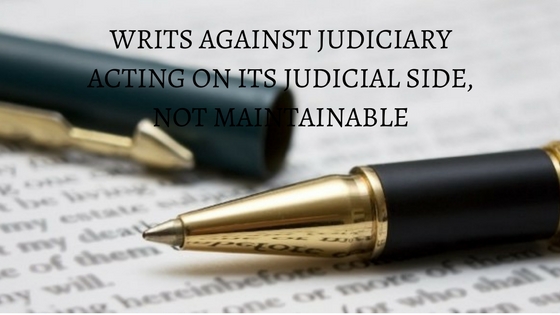Aapka Consultant Judgment Series- In this series, we are providing case analysis of Landmark Judgments of Hon’ble Supreme Court of India.
Riju Prasad Sarma etc. etc. v. State of Assam & Ors.
(2015) 42 SCD 764
JUDGES: Fakkir Mohamed Ibrahim Kalifulla and Shiva Kirti Singh
Date of Decision: 07-07-2015
FACTS:-
The Plea of the petitioner, in the present matter, is that no doubt fundamental rights under Articles 14 and 15 are guaranteed only against State action and not against private customs or practices but Judiciary is as much a part of State as the Executive and the Legislature and hence it cannot permit perpetuation of discrimination in violation of Article 14. In the said writ petition, the challenge was to the election of Dolois (head priest of the temple) held on 16.11.2011. The only ground urged on behalf of the petitioners was denial of equality under Article 14 of the Constitution while the respondents have argued that for the purpose of part III of the Constitution Article 12 defines the term “the State” to include the Government as well as Parliament of India as well as Government and legislature of the States but conspicuously it has left out the Judiciary and hence the Judiciary cannot be included and treated as ‘the State’ when it performs strictly judicial functions in contradistinction to administrative powers.
ISSUE:-
Whether, for the purpose of issuance of writs, judicial decisions by the judiciary can be included in the State action?
JUDGMENT:-
The Hon’ble Supreme Court has observed that the definition of the State under Article 12 of the Constitution of India is contextual depending upon all the relevant facts and the concerned provisions of Part III of the Constitution. The definition is clearly inclusive and not exhaustive. Hence omission of judiciary when the Government and Parliament of India and Government and Legislature of each of the State have been included is conspicuous but not conclusive that judiciary must be excluded.
The Court noted that while acting on the judicial side the courts are not included in the definition of the State. Only when they deal with their employees or act in other matters purely in administrative capacity, the courts may fall within the definition of the State for attracting writ jurisdiction against their administrative actions only.
It was further observed that the judgments of the High Court and the Supreme Court cannot be subjected to writ jurisdiction and for want of requisite governmental control; judiciary cannot be a State under Article 12. Such a contextual interpretation must be preferred because it shall promote justice, especially through impartial adjudication in matters of protection of fundamental rights governed by Part III of the Constitution.
HELD:-
The Court held that the judiciary in India, acting on its judicial side cannot be considered as a State under Article 12 of the Constitution, and that only when the Courts deal with their employees or act in other matters purely in administrative capacity, they may fall within the definition of the State for attracting writ jurisdiction. The Court also ruled that writs against the judiciary would lie against their administrative actions alone.
To Get Legal Opinion from Advocates/ Legal Experts, Please click here
To Get Legal Opinion from Retired Hon’ble Judges, Please click here












